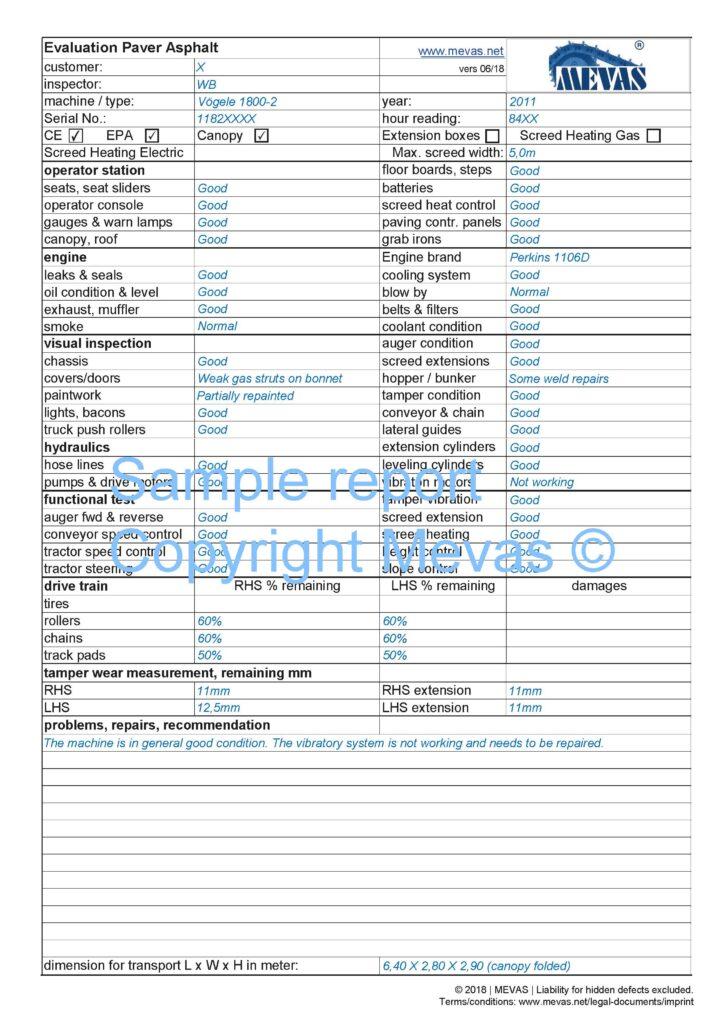If you order an asphalt paver inspection you would receive a detailed report
- Basic Machine information, configuration and screed width
- Operator Station details and condition
- Engine information and condition
- Condition of Exterior (chassis, bunker, tamper, conveyor, chain and guides)
- Condition of Hydraulic system (pump, performance, hydraulic lines and cylinders)
- Functional test
- Condition of the Drive Train
- Measurement of the Tamper
- Comments and recommendation for repairs
- Transport dimensions
See a sample of a report below. On request we can send a PDF-version of such a report.

What extras can you order?
Once you receive an offer it will be always for a basic walk-around with functional check. This level is called TA1. On our Checklist-Options page you can find additional services which you can order.
If you have questions about the service please contact the team by Whatsapp or by phone +493520639150. We are happy to answer in detail.
Pictures and video coming with a Mevas-Report
Each machine inspection comes along with 50-80 pictures and in some cases with a short video. In case of interest it is possible to see a paver report in detail on our Google-Drive folder.

Video about a Vögele paver inspection by Mevas
For some kind of machines we made a video about the inspection process. For a paver inspection a video is available on our YouTube-Channel.
Other sample reports heavy machinery
Visit our overview for other sample inspection checklists for heavy machinery.
Keep in mind: Report forms are our legal property and copying is a violation of our copyright.
Which items need attention during inspection of a used paver asphalt?
Inspecting an used asphalt paver is crucial to ensure that it’s in good working condition and will meet your construction needs. Here are some key items to pay attention to during the inspection:
- Overall Condition:
- Check for signs of excessive wear, rust, or damage to the main frame and components.
- Inspect the paint condition and play in pins and bushings as it can give you an idea of how well the equipment has been maintained.
- Engine:
- Start the engine and listen for any unusual noises, such as knocks or rattles.
- Check for visible leaks of oil or other fluids.
- Inspect the exhaust system for signs of damage or excessive smoke.
- Check the amount of blow-by to estimate engine wear.
- Hydraulic System:
- Check hydraulic hoses and connections for leaks, wear or damage.
- Operate all hydraulic functions (e.g., screed extension, elevation, conveyor) to ensure they are smooth and responsive.
- Look for any signs of hydraulic fluid contamination.
- Tracks or Tires:
- Inspect the condition of tracks or tires for wear, damage or uneven wear patterns.
- Check the tension of tracks and look for any loose bolts or damaged components.
- Screed:
- Inspect the condition of the screed plates and extensions for wear (ultrasonic measurement).
- Check for proper heating and temperature control functionality (infrared thermometer or camera).
- Verify that all screed adjustments and extensions operate smoothly.
- Conveyor System:
- Check the condition of the conveyor belts and chain for wear and proper tension.
- Ensure that the conveyor system operates smoothly without any unusual noises.
- Electrical System:
- Inspect the wiring for any signs of damage or poor connections.
- Test all electrical controls and instruments to ensure they are functioning correctly.
- Operator’s Station:
- Check the condition of the operator’s seat and controls.
- Test all gauges, indicators and warn lights.
- Ensure that heating and air conditioning systems are working properly.
- Fluid Levels:
- Check the levels of engine oil, hydraulic oil, coolant and other essential fluids.
- Ensure that all fluid reservoirs are free from contamination.
- Documentation:
- Request maintenance records and any available service history.
- Check if the equipment has undergone any recent repairs or major overhauls.
- Performance Test:
- If possible, conduct a test run to assess the overall performance of the paver.
- Check the drive and steering operation (manual and automatic mode).
Always consult the manufacturer’s guidelines and specifications for the specific model of asphalt paver you are inspecting. If you are not familiar with the equipment, consider bringing along a qualified mechanic or MEVAS-technician to assist with the inspection.
Liste de contrôle pour une finisseur d’asphalte
Tu trouveras ici un exemple de liste de contrôle pour une finisseur routiere. Cette fiche d’inspection est utilisée pour inspecter les machines d’occasion. 60 points sont contrôlés et l’inspecteur note toutes ses observations et décrit les défauts constatés. Tu trouveras une liste de tous les formulaires disponibles ICI. La version de la liste de contrôle présentée ici n’est pas la version la plus récente. Nos rapports d’inspection sont régulièrement mis à jour.

